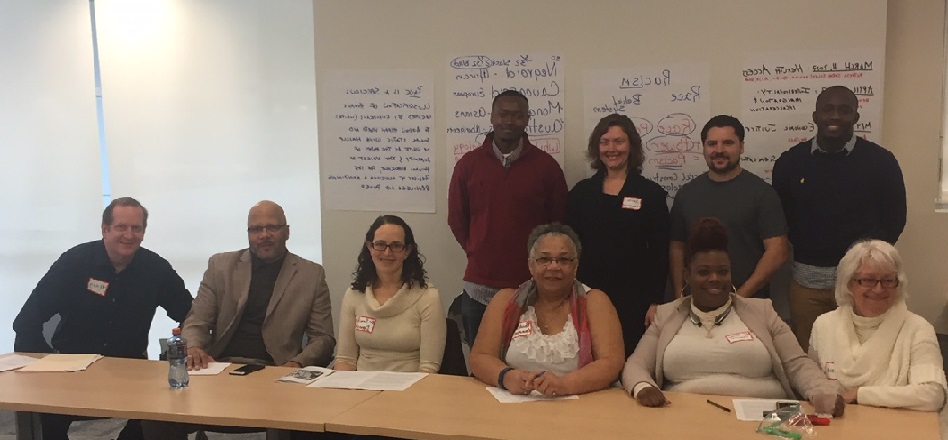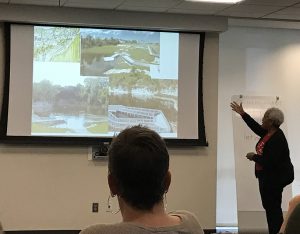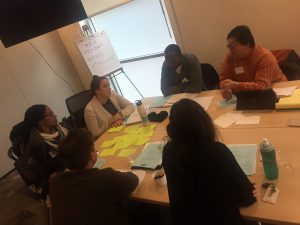
Fighting the Forces of Reaction: The Quentin D. Young Equity Project
On November 19, 2016 Health & Medicine launched a new initiative that honors the life and work of our organization’s founder, Dr. Quentin D. Young. Quentin was a life-long leader in social justice movements. The Quentin D. Young Equity Project (QDY Equity Project) aims to shape the next wave of progressive activists to build on his legacy.

The QDY Equity Project brings together people from different backgrounds and sectors to build relationships and explore new approaches to achieving an equitable society. Our goal through the project is to provide an opportunity for our participants to learn from their justice-minded colleagues in other fields, create lasting networks, question and analyze current approaches, and collaboratively create innovative and effective solutions to address barriers to equity. A key element of participation includes collaboratively learning, developing new forms of transdisciplinary knowledge, and further developing as intergenerational and inter-sectoral equity activists.
With the support of our Board of Directors and a committed steering committee inspired by the vision of this project, in the summer of 2016 Health & Medicine initiated recruitment for our first cohort of QDY Equity Project activists. The interest we received was overwhelming and we responded to requests for information from over 50 professionals from diverse sectors. As a result of this enthusiastic response, we ultimately decided to invite 31 participants to join our first cohort—an increase from the 20-member group we initially planned for. Our final group is representative of the range of voices and perspectives needed to foster innovative solutions and includes diversity of gender, race, and age with participants ranging from those in their 20s to 60s, as well as a range of professional backgrounds including education, nursing, transportation, behavioral health, community development, and sustainable energy just to name a few.
Over the six-month pilot project, they will work together to explore a simple, but critical question, “How can we achieve social justice?”
The Launch
The group began working together this fall at a day-long retreat which began with energizing remarks from Janaé Bonsu, National Public Policy Chair for Black Youth Project 100 and Dr. Barbara Ransby, professor of History, African American Studies, Gender and Women’s Studies at UIC, and President of the National Association for Women’s Studies. After lunch and a discussion of the Ava DuVernay’s documentary, 13th participants engaged in a cross-sectoral group exercise where they developed a six-month popular education based curriculum that they would collaboratively facilitate.
The diverse issues the group’s selected to discuss over the project include:
- Climate Change
- Whiteness
- Health Access
- Intersectionality of Immigration and Incarceration
- Economic Justice & Workers’ Rights
- Structural Segregation
After attending the launch, one participant shared, “My hope was to meet the other participants and learn what the first six months would look like. I also think I need to be re-energized and given hope post-election, and that definitely happened.”
What We’ve Learned So Far
 We are now at the halfway point of Equity Project pilot and are pleased to share that it been an enormous success thus far. After our launch, the group’s first session focused on Climate Change, taking a trans-disciplinary approach that connect this issue to the overall fight for equity. The participant-facilitators spent the day drawing connections between climate change and civil rights struggles. For example, they highlighted the case of high lead levels in the city of Chicago and how it disproportionately impacts communities of color. They also challenged their fellow participants to explore how they could confront food waste in their specific sectors and communities. One participant reflected, “Learning about climate change was interesting. I haven’t thought about how climate change connects to social action or social organizing.”
We are now at the halfway point of Equity Project pilot and are pleased to share that it been an enormous success thus far. After our launch, the group’s first session focused on Climate Change, taking a trans-disciplinary approach that connect this issue to the overall fight for equity. The participant-facilitators spent the day drawing connections between climate change and civil rights struggles. For example, they highlighted the case of high lead levels in the city of Chicago and how it disproportionately impacts communities of color. They also challenged their fellow participants to explore how they could confront food waste in their specific sectors and communities. One participant reflected, “Learning about climate change was interesting. I haven’t thought about how climate change connects to social action or social organizing.”
The next session centered on “Whiteness.” The participant-facilitators invited Diana Dunn of the Peoples’ Institute for Survival and Beyond to conduct a two-part workshop on whiteness. The first workshop defined race and racism and the second workshop focused on white affirmative action. This session strengthened peoples’ understanding of racialization and structural racism and helped them to consider how the invention and maintenance of whiteness—and thus, white supremacy—has played out throughout history, and in their lives and work. One participant captured the group’s thoughts on our speaker, “[She] laid a great foundation for understanding racism as a way to maintain white supremacy and for shared definitions.”
Our most recent session addressed Health Access. The participant-facilitators invited Dr. Claudia Fegan, board president at Health & Medicine and treasurer of Physicians for a National Health Plan to kick off the day. Dr. Fegan provided a comprehensive overview of the healthcare crisis in the US and offered a health equity perspective on the benefits of a single payer health care plan. The rest of the day included small group discussions on four areas of health access and equity—education, disability, abortion access, and mental health access–placing an emphasis on addressing the crosscutting themes that emerged throughout the day. One participant summed up the day’s highlights beautifully:
“The discussion on the “Single Payer” system was great. Learning how simple it is to establish and learning how much money would be saved by having this type of system was interesting. I enjoyed the mental health and abortion talks the most. The speaker for the mental health group was open and shared his struggle with mental health. He was excellent!!!”
 The QDY Equity Project’s emphasis on popular education as a method to incubate inter-sectoral collaboration and action has been intentional. Our participants have taken the lead in developing cross-cutting topics and facilitating sessions in ways that actively engage their peers across identities, sectors, and social movements. We believe this collaborative learning approach is particularly valuable at a time in our history when so many of our public policies, programs, and institutions are threatened. Health & Medicine’s Quentin D. Young Equity Project is responding to these threats by reactivating methods and models that have historically built broad based networks of solidarity that advance social justice, while also working towards innovative new solutions, and developing new models for change.
The QDY Equity Project’s emphasis on popular education as a method to incubate inter-sectoral collaboration and action has been intentional. Our participants have taken the lead in developing cross-cutting topics and facilitating sessions in ways that actively engage their peers across identities, sectors, and social movements. We believe this collaborative learning approach is particularly valuable at a time in our history when so many of our public policies, programs, and institutions are threatened. Health & Medicine’s Quentin D. Young Equity Project is responding to these threats by reactivating methods and models that have historically built broad based networks of solidarity that advance social justice, while also working towards innovative new solutions, and developing new models for change.

